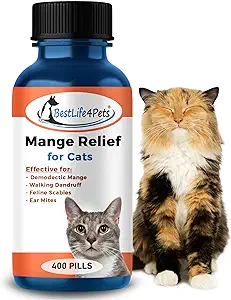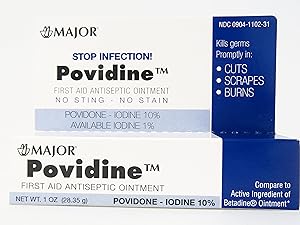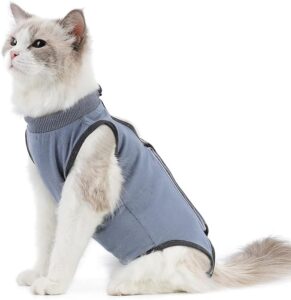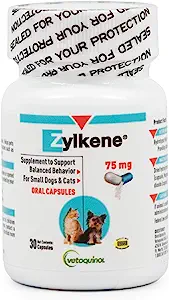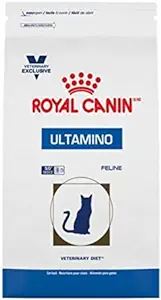What causes itching on your cat's belly?
A cat with an itch on its belly can get this itching stimulus in different ways. There may be a stimulation of a nerve in the skin that sends an itch signal to the brain. But it is also possible that a substance called histamine is released in the skin of the abdomen. This histamine is released by mast cells. Mast cells are part of the immune system. The substance histamine can then attach itself to nerve endings and in this way pass on the stimulus in the brain that there is an itch. Whichever way it arises, the result is a cat with an itch on its belly.
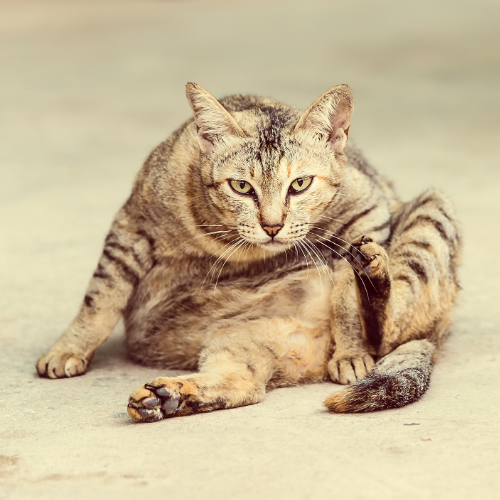
What causes a cat with an itchy belly?
There are several possible causes of itching on your cat’s belly. The most common cause is fleas. But mites, allergies, skin infections or stress are also possible causes of a cat with an itch on its belly.
fleas
Fleas are of course very common in cats. It are small black bugs that live on your cat’s skin. They cause itching all over your cat’s body, but since they prefer to live in nice warm places, they are common on your cat’s belly. Fleas bite your cat to suck blood so they can reproduce. But both moving over your cat’s skin and biting it will result in a cat with an itch on its belly. The nerves in your cat’s skin pick up that signal and relay it to his brain.
flea allergy
In most cases, a flea allergy does not itch on the belly, but mainly on the back near the base of the tail. They often have some scabs there and the coat can become thinner. But still, a cat with an itch on its belly might suffer from a flea allergy. There is an allergic reaction to the flea’s saliva that enters your cat’s body after the flea has bitten your cat to draw blood from it. In case of 1 flea on your cat’s body, which you usually don’t even see yourself, your cat can already have very intense itching complaints. So an flea allergy has a different itch than just a flea infestation.
mites
Mites are parasites that, depending on the species, live in or on a cat’s skin. They can cause damage to a cat’s skin. In Europe, the Sarcoptes mite and the Cheyletiella mite mainly play a role. In other places there are different kinds of mites that infest cats. The Sarcoptes mainly gives crusty lesions, the Cheyletiella mite mainly gives dandruff in the coat. But both can result in a cat with an itch on its belly.
Skin inflammations
When small wounds have arisen in your cat’s skin, for example as a result of a fight, they can become inflamed. Or maybe even get infected with bacteria. Both forms can cause your cat to experience itching on its stomach. The healing of the wounds can also cause a cat to have an itch on its belly.
But contact with certain chemicals can also damage the skin. Plants or certain cleaning products in particular can cause your cat’s stomach to itch in this way.
Allergic reactions
Among the allergic reactions that can cause itching on your cat’s belly, we have three options in this case. The food allergy, the atopy and the contact allergy. And all of them can result in a cat with an itch on its belly.
The food allergy arises as a result of an allergic reaction to a substance in your cat’s food (or treats). In that case, it usually concerns a protein source from a certain animal species or a certain type of grain. But preservatives are also possible. This causes skin inflammation and itching on your cat’s belly. Or on other body parts of course.
An atopy is an allergic reaction to a substance in the air that your cat breathes in. For example, tree pollen, grass pollen, house dust mites, etc. These substances cause an excessive immune response, which causes your cat to develop skin infections and a lot of itching on his belly or other body parts.
A contact allergy is an excessive reaction to something the skin comes into contact with. The abdomen is particularly sensitive to this because the fur on the abdomen is less compact and therefore acts less as a barrier. These kinds of reactions are mainly related to cleaning products, to their pillow or bed or to detergents with which you have washed their blankets or beds with.
Stress or anxiety
Cats that are stressed or anxious try to calm themselves down by grooming themselves more often. They relax from this and better deal with the stress they have. However, it can cause them to lick themselves bald and in very serious cases they can even lick the skin on their belly raw, resulting in skin infections. This excessive washing is also often misunderstood with the owner thinking that their cat has an itch on its belly. It is not always due to an itch.
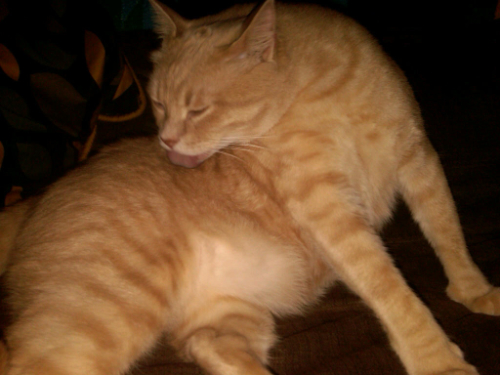
How do you treat an itching belly in your cat?
It goes without saying that treatment depends on the cause of the itching. But in many cases you don’t know the cause. In that case it is wise to try different things.
Treat fleas and mites
If you clearly see fleas on your cat, an ordinary flea product will suffice. But in many cases you do not know whether fleas or mites are present. In this case it is best to use a remedy that works against both. For example, you can use Stronghold, Bravecto or Advocate for this. You can only get these resources at the counter of your vet. After giving the remedy, your cat with an itch on its belly should be a thing of the past within a few days. However, if there is a flea allergy, this can also take up to ten days.
You can also try to give your cat Mange Relief for cat’s if you prefer a more natural treatment. But the products you buy at your vet act stronger against mites and fleas.
Skin inflammations and skin infections
When the skin looks red and irritated, you can rub the skin 3 times a day with honey ointment or calendula ointment. This allows the skin to relax a bit. You should see that your cat no longer has an itch on its belly within a few days.
If the skin on the abdomen also seems to be moist and clammy, there probably is an infection. In that case it is wise to rub the itchy spots twice a day with iodine ointment. This kills bacteria and thus prevents skin infections. However, your cat will lick this up and may develop diarrhea. It is therefore wise to wear a medical pet shirt so that he does not ingest the iodine. Your cat with an itch on its belly should be much less bothered by it within 3-4 days.
Stress or anxiety
If you think your cat is a stress-sensitive type or if you know that he is anxious about something, it is wise to address this. In extreme cases, you can ask your vet for medication. But in most cases Zylkène is already very suitable. After you have started giving this, you will in most cases already see that your cat will wash itself less within a week.
Zylkene is a dietary supplement commonly used to reduce stress and anxiety in cats. The active ingredient in Zylkène is a milk protein called Alpha-casozepine, which is extracted from casein, a milk protein that occurs naturally in breast milk. It is important to understand that Zylkène is not a drug, but rather a dietary supplement that can help to combat feelings of stress.
How Zylkene works to reduce stress in cats is not fully understood. But it is believed to have to do with the effect of Alpha-casozepine on certain receptors in the brain. Alpha-casozepine has a calming effect and can help your cat relax without becoming drowsy.
Preventing contact allergies
With a contact allergy, only the source of the allergic reaction needs to be removed. It is therefore wise to thoroughly clean the surface where your cat prefers to lie with only water. You can wash his blanket or bed on which he is lying in the washing machine with only water at a slightly higher temperature. That way you remove any chemical agents that may be incorporated in it. If the complaints have arisen after you have bought a new basket or bed, it is wise to (temporarily) remove it. Are his complaints disappeared within a week, you know that it was the cause. When you really need to treat something with a cleaning agent, it is best to use green soap. There are hardly known cases of allergic reactions to green soap. Your cat should no longer have an itch on its belly after a few days.
Do a food allergy test
You can do a food allergy test yourself. But you do need some patience. To determine this, your cat may only receive a special food for 8 weeks that does not contain any substances to which it can react allergically. The best food for a food allergy is Royal Canin Ultamino. During the 8 weeks that your cat receives this, he should absolutely not eat anything else. No candies, no things from your fridge, nothing. Only his new anti-allergy food.
You probably won’t see any changes for the first 4 weeks. But in the last 4 weeks you shouldn’t have a cat with an itch on his belly, if he really has a food allergy. If it is clear that he has an allergy, you can try whether the less strong, and therefore cheaper, anti-allergy foods also work sufficiently for your cat. But first you need to know for sure if it’s a food allergy.
Treating an atopy
The only allergy that you cannot solve yourself is the atopy. This is an allergic reaction based on environmental substances in the air. So tree pollen, grass pollen, house dust mites, etc. Do you feel that this could be the cause of the itch on your cat’s belly? Then it is wise to go to a vet. He can investigate further. For example, a blood test. He or she can also choose to prescribe medication that will suppress the complaints.
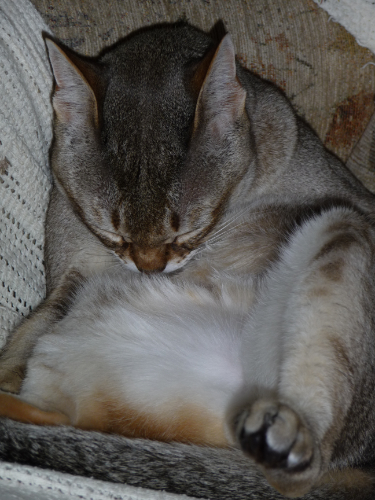
Good luck!
We hope you have found the answer to your cat’s problem of a belly itch. Good luck to the both of you.

